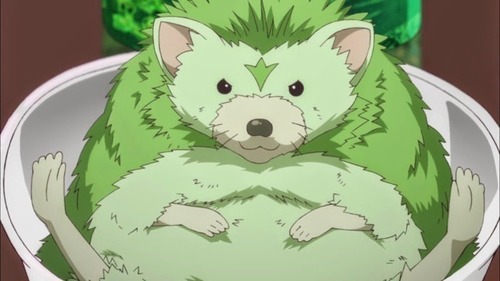The mean green parody machine.

Let’s not beat around the bush: I loved the first three episodes of Boueibu. Just absolutely adored them. It’s a show that knows exactly what it’s doing and does it very well, and while it doesn’t match Nozaki-kun in terms of sheer subversive genius (yet), it comes very close to matching it in terms of the amount of pure, giddy glee I experience while watching it.
Boueibu is first and foremost a parody of the magical girl genre, but—as is the case with the best parodies—it’s also a love letter to the shows it’s mocking. Yes, it takes its fair share of jabs at the inherent silliness of magical girls, and in doing so points out some of the flaws of the genre, such as how the heroes tend to be forced into their new identities rather than choosing them, and how the cutesy animals doing the choosing often intentionally withhold information from the heroes. It’s also more than happy to poke fun at other anime/manga trends by mapping the all-girls school and “Class S” relationships of cute-girl shows (including many recent magical girl series) onto the boys, and riffing on itself for resembling a “fujoshi bait” series.
But make no mistake: For all its teasing, Boueibu by no means hates the magical girl genre. I may have compared it to Nozaki-kun right off the bat, but for me, the series it most closely resembles is Slayers, which made fun of DnD-style high fantasy while also adoring DnD-style fantasy. Great parodies tend to come from a place of love—you can’t mock something if you haven’t watched it enough to understand its trends and tropes, after all—and Boueibu seems to be in this same vein, as it simultaneously teases the genre while also ultimately buying into many of the central themes about love, human weakness, and redemption that are so common in magical girls shows.
Episode 3, for example, is absurd, involving a Pretty Boy Contest and a monster ballerina swan, but the moral at its core (“you should love yourself before obsessing over the love of others”) is heartfelt and genuine. Boueibu is ridiculous, but it can also be kind of sweet, and as such it resembles the ‘90s magical girl classics like Sailor Moon and Rayearth (which were also happy to poke fun at themselves) more than you’d expect.
Beyond that, Boueibu has one massive strength and one potential weakness, depending on how you look at it. The strength is that it excels at creating comedy out of dissonance and juxtaposition—in how two individuals react to a situation, in how different groups respond to a crisis, and particularly in how the writing treats a scene versus how the direction/animation treats it.
Case in point: That damn hedgehog, Lord Zundar. The opening scene to Episode 2 had me in absolute stitches because of the contrast between Adorable Green Hedgehog Twitching Its Nose and Playing In A Teacup versus Ultra-Deep-Voiced Villain Revealing Totally Serious Plan For World Domination. That’s a match made in comedy heaven, right there, and a conscious effort between writer(s) and director to take something that looks serious on paper and make it utterly absurd.
Now as for that weakness…Hm. I’m not sure how to explain this except to say that the creators have a lot of confidence that their audience is smart enough to get the joke, and that if the audience doesn’t get the joke, the series could actually end up hurting rather than helping its cause. The best example I can use here is again from Episode 3 and how it handles some of its “boys’ love” (BL) themes, first during the early scene that basically leads to “boys are better than girls, therefore boys should love other boys,” and later when the villains reveal that their Nefarious Scheme is to “make boys only love other boys so that the human race will die out due to a lack of progeny.”
Now, the way I read this (particularly coupled with all the other silliness going on) is that the series is intentionally pointing out real-life absurdities. First in how it addresses the actual sexism inherent in some BL stories (The Great Mirror of Male-Love, written way back in 1687 and probably the most famous early example of queer fiction in Japan, is positively rampant with misogyny), and second in how it highlights the absurdity of the “But gay couples can’t have children!” argument against same-sex marriage that exists in the real world. Because if you want to make something sound ridiculous, have a deep-voiced hedgehog say it while nestled in the StuCo President’s jacket pocket.
All of that is great and points to the possibility of Boueibu being a sneakily progressive show, but because the series doesn’t belabor its point, if the audience doesn’t interpret it this way—i.e., if they think the series is actually endorsing the casual sexism or homophobia of these scenes—then Boueibu winds up accomplishing the opposite of what (I think) it set out to do. Which could definitely be a problem and is why, I suppose, I just spent all this time talking about it—to offer my own interpretation, and explain what I see as the show’s true intentions.
Granted, we’re only three episodes in, so there’s still plenty of time for the series to either prove that these early glimmers of social/genre criticism are legitimate, or to devolve into straight-up silliness. I’d prefer the first, but I wouldn’t exactly mind the second. Straight-up silliness has its place too, after all, and sometimes it’s nice to just kick back and enjoy something. Regardless of where we go from here, I expect Bouiebu to keep me giggling, and as long as it does that, then I’m happy to keep watching.

2 thoughts on “Rule of Three Review: Cute High Earth Defense Club LOVE! – Episodes 2-3”